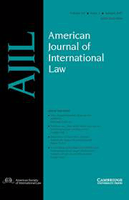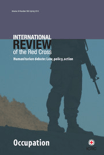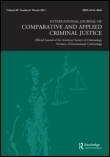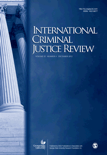
International Criminal Law Review
Scope & Guideline
Advancing Global Justice Through Scholarly Insight
Introduction
Aims and Scopes
- International Criminal Law and Justice Mechanisms:
The journal focuses on the frameworks and mechanisms of international criminal law, including the International Criminal Court (ICC) and other tribunals, examining their roles in addressing crimes against humanity, war crimes, and genocide. - Victimology and Rights:
It addresses the rights and roles of victims within the international criminal justice system, exploring themes such as victim participation, reparations, and the impact of crimes on affected communities. - Transitional Justice:
The journal emphasizes the importance of transitional justice in post-conflict societies, investigating how legal processes can contribute to reconciliation, truth-telling, and societal healing. - Gender and Intersectionality:
A critical examination of gender issues in international criminal law, the journal explores how gender and intersectionality affect the prosecution and victimization of crimes, particularly in conflict situations. - Ecological and Environmental Crimes:
Emerging discussions focus on the recognition and prosecution of environmental crimes, including ecocide, as an integral part of the international legal framework. - Historical and Cultural Contexts:
The journal explores how historical narratives and cultural contexts influence the understanding and application of international criminal law, including the role of memory and justice.
Trending and Emerging
- Nonviolent Resistance and Authoritarian Regimes:
Recent publications highlight the dynamics of dissent and nonviolent resistance in authoritarian contexts, examining how these movements interact with international criminal law and justice systems. - Children and Armed Conflict:
There is a growing focus on the implications of armed conflict on children, particularly the recognition of children born of war and their treatment within the framework of international law. - Gender-Sensitive Legal Approaches:
The journal increasingly emphasizes the need for gender-sensitive approaches in international criminal law, addressing issues such as sexual violence and the representation of gender in legal proceedings. - Digital Evidence and Technology in Justice:
Emerging themes include the role of digital evidence and technological advancements in the prosecution of international crimes, reflecting the changing landscape of evidence gathering and legal proceedings. - Environmental Justice and Ecocide:
The exploration of ecocide as a crime under international law is gaining traction, highlighting the intersection of environmental issues with human rights and accountability. - Impact of International Criminal Justice on Local Communities:
There is an increasing interest in understanding the local impacts of international criminal justice interventions, focusing on how these processes affect affected communities and their pursuit of justice.
Declining or Waning
- Traditional Military Crimes:
There has been a noticeable decrease in papers specifically addressing traditional military crimes, such as war crimes committed by state actors, as the focus shifts to non-state actors and broader issues of accountability. - Strict Legalistic Approaches to Justice:
The journal appears to be moving away from purely legalistic analyses of international criminal law, favoring more interdisciplinary approaches that integrate political, social, and psychological perspectives. - Universal Jurisdiction Debates:
Discussions around universal jurisdiction seem to be less frequent, possibly indicating a shift toward more pragmatic approaches to international accountability that consider state sovereignty and bilateral agreements. - Focus on Historical Trials:
While historical trials have been significant, there seems to be a waning interest in revisiting past cases in favor of addressing contemporary issues and emerging challenges in international criminal justice. - State Responsibility Over Individual Accountability:
There is a decline in emphasis on state responsibility for international crimes, as the discourse increasingly centers on individual accountability and the role of international institutions.
Similar Journals

AMERICAN JOURNAL OF INTERNATIONAL LAW
Exploring the Frontiers of Legal ScholarshipThe American Journal of International Law, published by Cambridge University Press, stands as a crucial platform for scholarly discourse in the fields of law, political science, and international relations. With a longstanding tradition since its inception in 1937, this prestigious journal has maintained a remarkable reputation, reflected in its Q1 ranking in both Law and Political Science and International Relations as of 2023. It is recognized for its rigorous peer-review process and impactful contributions to the understanding of legal frameworks and international governance. Researchers and practitioners alike will find the journal invaluable, not only for its comprehensive analyses and original research articles but also for its commitment to advancing the field. Although it does not offer open access, its accessibility through academic institutions ensures that a broad audience can engage with its content, making it essential reading for those involved in international legal scholarship.

Journal of Criminal Law
Exploring the Depths of Justice and LawWelcome to the Journal of Criminal Law, a prestigious publication in the field of legal studies, expertly published by SAGE Publications Ltd. With a rich history that dates back to 1937, this journal has been a vital platform for disseminating innovative research and critical analyses pertaining to criminal law and justice issues. The journal boasts a commendable Q2 ranking in the Law category for 2023, placing it among the top tier of legal publications. It is recognized for its impactful contributions, as indicated by its impressive Scopus Rank of #346 out of 1025 in the Social Sciences - Law category, positioning it within the 66th percentile. Although it does not currently offer open access options, researchers, professionals, and students will find a wealth of rigorously peer-reviewed articles that address contemporary challenges and developments in criminal law. Based in the United States, the journal is committed to fostering scholarly dialogue and advancing understanding in an ever-evolving legal landscape.

International Community Law Review
Shaping the Future of International Legal Thought.International Community Law Review, published by MARTINUS NIJHOFF PUBLISHERS, is a distinguished journal that contributes significantly to the fields of law and international relations. With an ISSN of 1871-9740 and an E-ISSN of 1871-9732, this journal serves as a vital platform for scholarly discourse on issues pertaining to international law, promoting a deeper understanding and engagement with complex legal frameworks and global challenges. Currently classified in the Q3 quartile for Law and Political Science and International Relations, the International Community Law Review ranks 475 out of 1025 in the Law category and 386 out of 706 in Political Science, reflecting a moderate impact in the academic community. Though it does not currently offer Open Access, the journal's extensive coverage from 2007 through 2024 ensures that it remains a relevant resource for researchers, professionals, and students. Published in the Netherlands, this journal aims to foster the development of international legal thought, support academic research, and facilitate discussions that shape modern international legal practices.

International Review of the Red Cross
Exploring the intersections of law, action, and global impact.The International Review of the Red Cross, published by Cambridge University Press, serves as a premier platform for discourse in humanitarian law, humanitarian action, and international relations. With its ISSN 1816-3831 and E-ISSN 1607-5889, this esteemed journal covers a broad range of topics at the intersection of law, sociology, and political science, making it an essential resource for researchers, practitioners, and students alike. Currently maintaining a commendable impact factor and sitting in Q2 within its respective categories, the journal demonstrates its significant contribution to scholarly conversations, ranking #426 out of 1025 in Social Sciences - Law and #773 out of 1466 in Sociology and Political Science in 2023. The journal has been converging its critical insights and academic rigor since 2005 and will continue until 2024, fostering an environment for innovative research and interdisciplinary approaches. Engaging with open access content, it provides invaluable perspectives that shape policy and practice in humanitarian efforts on a global scale.

QUEENS LAW JOURNAL
Advancing Legal Scholarship with IntegrityQUEENS LAW JOURNAL is a prestigious legal journal published by Queen's University, Faculty of Law, located in Kingston, Ontario, Canada. With its ISSN 0316-778X, the journal serves as a key platform for academic discourse and research in the field of law, encompassing various disciplines such as criminal law, constitutional law, and international law. Although currently not available as Open Access, the QUEENS LAW JOURNAL maintains a strong reputation for publishing impactful research, making it a vital resource for legal scholars, practitioners, and students alike. By fostering an environment for innovative legal theories and critical analyses, the journal plays an essential role in advancing legal scholarship and promoting informed discussions on pertinent legal issues. Emphasizing quality and rigor, the QUEENS LAW JOURNAL is a valuable addition to any academic library and serves as a trusted reference for those engaged in the legal profession.

Revista General de Derecho Penal
Fostering scholarly insights in criminal law.Revista General de Derecho Penal, published by IUSTEL, is a premier academic journal dedicated to the dynamic field of criminal law. With an ISSN of 1698-1189, this journal serves as a crucial platform for researchers, legal professionals, and students to share their insights and findings related to penal law and its evolving applications in contemporary society. Although it is not an open access journal, it maintains high scholarly standards, helping to advance discourse in legal studies. The journal's address is C PRINCESA NO 29, 2A DCHA, MADRID 28008, SPAIN, positioning it within a vibrant academic community. With a focus on current legal challenges and theoretical advancements, Revista General de Derecho Penal plays an essential role in fostering understanding and developing effective legal frameworks in criminal justice, making it an invaluable resource for those engaged in the study and practice of law.

International Journal of Comparative and Applied Criminal Justice
Innovating research for impactful justice solutions.International Journal of Comparative and Applied Criminal Justice, published by ROUTLEDGE JOURNALS, TAYLOR & FRANCIS LTD, stands at the forefront of interdisciplinary research in the fields of law, sociology, and social psychology. With an ISSN of 0192-4036 and an E-ISSN of 2157-6475, this esteemed journal has been disseminating pivotal research since its inception in 1977. Recognized for its rigorous scholarship, it boasts a Q1 ranking in Law and positions itself within the top 85th percentile in Social Sciences - Law, emphasizing its impact on the academic community. Although primarily subscription-based, its accessibility ensures that critical findings reach a wide audience, supporting the advancement of knowledge across various disciplines. The journal's scope encompasses significant developments in applied criminal justice, making it an invaluable resource for researchers, policymakers, and students dedicated to understanding and improving justice systems globally. In its commitment to academic excellence, the journal continues to foster innovative dialogue and promote knowledge exchange, contributing significantly to current debates within the social sciences.

International Criminal Justice Review
Advancing global insights in criminal justice.International Criminal Justice Review is a premier journal in the field of law, published by SAGE Publications Inc, renowned for its commitment to advancing the understanding of criminal justice issues on a global scale. With an ISSN of 1057-5677, this journal spans a rich history from its inception in 1991 to its ongoing contributions into 2024, supporting a diverse array of research that addresses both theoretical and practical concerns in international criminal law. The journal holds a prestigious Q1 ranking in the Law category for 2023, reflecting its influence and relevance, as evidenced by its impressive Scopus rank of #68 out of 1025 in the Social Sciences Law field, placing it in the 93rd percentile. Though not an open-access journal, it provides vital access options for institutions and individuals alike. International Criminal Justice Review serves as a critical resource for researchers, practitioners, and students dedicated to exploring the complexities of international criminal justice systems, offering a platform for innovative scholarship that informs policy and practice worldwide.

HARVARD LAW REVIEW
Exploring the Depths of Legal Insight.HARVARD LAW REVIEW, an esteemed publication by the Harvard Law Review Association, stands as a cornerstone of legal scholarship in the United States, boasting an impressive ISSN of 0017-811X and E-ISSN 2161-976X. Renowned for its rigorous editorial standards and comprehensive analyses, this journal occupies the prestigious Q1 category in Law, ranking #149 out of 1025 in Scopus, which places it in the 85th percentile among its peers in the Social Sciences Law category. With a publication history stretching from 1973 to 2024, it consistently features groundbreaking articles, influential essays, and critical commentaries that shape contemporary legal thought. Although not an open-access journal, HARVARD LAW REVIEW remains indispensable for researchers, professionals, and students who seek to engage deeply with the evolving landscape of law. Its rigorous academic focus empowers scholars and practitioners alike, making it a vital resource in the field.

International Journal of Criminal Justice Sciences
Unlocking insights in criminal justice sciences.The International Journal of Criminal Justice Sciences is a premier academic publication dedicated to advancing the field of criminal justice through rigorous research and innovative scholarship. Published by MANONMANIAM SUNDARANAR UNIVERSITY in India, this Open Access journal has been a vital platform for researchers since 2006, promoting unrestricted access to critical knowledge and insights in the realm of law and criminal justice. With a commendable Scopus ranking of #379 out of 1025 in the Social Sciences - Law category, placing it in the 63rd percentile, it holds an essential position for those engaged in legal studies. The journal is particularly beneficial for academics, practitioners, and students aiming to explore contemporary issues, innovative practices, and theoretical advancements in the discipline. Its commitment to quality research is reflected in its Q3 Quartile designation and the continuous convergence of research contributions anticipated from 2017 to 2024. Whether you are looking to publish your findings or seek valuable insights from peer-reviewed articles, the International Journal of Criminal Justice Sciences remains an indispensable resource for fostering knowledge and dialogue in this critical field.